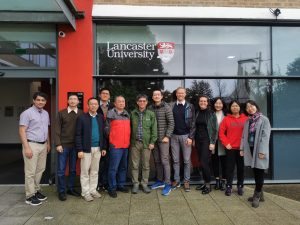
Participants at the SIRIUS project launch workshops 10-11 Oct 2019 L-R: Mustafa Ali, Su Xu, Wei Huang, Bing Gao, Degang Yang, Shenghui Cui, Lingxuan Liu, Timo von Wirth, Aniek Hebinck, Jing Zhang, Lan Wang and Jingjing Yin
The urban food system, which connects supply chains all over the world, is also a linkage of human beings’ past, present and future. Our SIRIUS project, which stands for a Sustainable, Innovative, Resilient and Interconnected Urban food System and is funded by ESRC under the JPI-UE Sustainable and Liveable Cities and Urban Areas, held a workshop recently at Lancaster. The members of the SIRIUS consortium from Lancaster University (Pentland Centre for Sustainability in Business), the Dutch Research Institute for Transitions (DRIFT) and Chinese Academy of Science spent two days together discussing the research boundary as well as the roadmap of the SIRIUS project.
Team members from China were the first to arrive at the Lancaster campus after a dozen hours of flying. To get everyone more involved, our team building, which is also the warm-up activity of the workshop, was closely related to the urban food system. We had a traditional Chinese dumpling dinner, with the hand-made dumplings we packaged on the spot. Dumplings are quite a common Chinese food, usually made by wrapping a good amount of meat in a palm-sized piece of dough. In order to collect ingredients, we first visited the on-campus supermarket of Lancaster University. The varieties of food sold in the supermarket are not so much affected by the location of the supermarket. Chinese and British supermarkets are almost identical in terms of food categories, although there are differences in specific types. In the small Spar, it is easy to find vegetables and fruits from the Netherlands, instant noodles from China, meat from other parts of the UK and, of course, dairy products from nearby Lancashire. The formation and development of a city’s food system is not isolated, with countless trans-local supply chains linking an urban food system to producers across the whole world.
At the same time, the urban food system of a region reflects the comprehensive effect of its particular geography, history and culture. The diets of our partners from all over the world have a deep local stamp, and even the dietary habits of members from China have been shaped by their distant hometowns. Normally, people from northern China prefer, and are better at making food with, wheat flour than their southern compatriots. Fortunately, our team had several “dumpling experts” from northern China who enthusiastically taught other members how to make authentic Chinese dumplings from scratch, even though we used meat, flour and seasonings from a typical British supermarket. The convenient global food supply chain connects food production and consumption systems in different regions, as well as the stomachs and hearts of our team members.
In the global trade era, agriculture, supply chains and human labour jointly connect most food systems across the world. As cities generally do not produce food by themselves, their food systems are particularly dependent on supply chains. Along with the improvement of global urbanisation and the aggregation of urban population in cities, the development of urban food system will undoubtedly be transmitted through the supply chain in every link, and thus produce huge social and economic transformation trans-locally. Under the context of climate change, a key questions is how to make interconnected urban food systems more resilient and sustainable, and what innovations can achieve such goals? These are the focus of the SIRIUS project, and this workshop is part of our joint efforts to achieve these goals.
During the two-day workshop, our team members from China, the Netherlands and Lancaster shared their latest research findings in their respective fields. More importantly, the whole team clarified the intersection of interests across their respective teams and thus conducted fruitful discussions on the cooperation pathways of the project. The team also agreed to push forward the project under the framework of the United Nations Sustainable Development Goals Nations and further pointed out the direction of efforts for the advancement of the SIRIUS project.